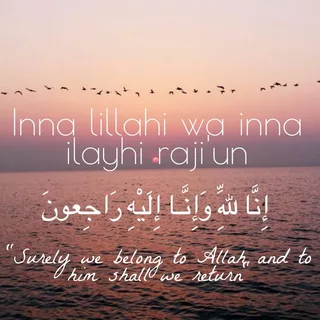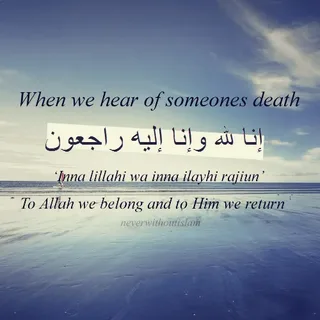Last Updated on January 9, 2024 by Arabian Tongue Team
what to say in islam when someone passes away, Losing a loved one is an inevitable part of life, and in Islamic tradition, expressing condolences holds profound significance. The journey of comforting someone grieving involves a delicate balance of words, actions, and cultural sensitivity. In this article, we’ll explore the heartfelt ways to convey sympathy in Islam and support those coping with loss.
what to say in islam when someone passes away

Dealing with the passing of a loved one is a universal experience, and Islam provides a rich tapestry of responses to such moments. The act of expressing condolences is not merely a formality; it is a deeply ingrained practice that showcases empathy and solidarity.
1. The Immediate Response: Saying Al-Inna Lillahi Wa Inna Ilaihi Raji’un
In the initial moments of learning about someone’s passing, the immediate response in Islam is often the utterance of “Al-Inna Lillahi Wa Inna Ilaihi Raji’un.” This phrase translates to “Surely, we belong to Allah, and to Him, we shall return.” It signifies the acceptance of the divine decree and acknowledges the transient nature of life.
2. Offering Support to the Bereaved
Beyond the initial response, expressing genuine empathy is crucial. Reiterating the phrase “Inna Lillahi Wa Inna Ilaihi Raji’un” during conversations lets the bereaved know that their pain is acknowledged and shared. This simple yet powerful expression provides a connection that goes beyond words.
3. Reciting Quranic Verses
Turning to the Quran for solace is a common practice in Islam. Verses like Surah Al-Baqarah (2:155) and Surah Al-Fajr (89:27-30) offer words of comfort and reassurance during times of grief. Sharing these verses can provide solace and remind the bereaved of the eternal nature of the soul.
4. Making Dua for the Deceased
In addition to verbal expressions of sympathy, making dua (prayer) for the departed soul is encouraged. Offering heartfelt prayers and supplications for the deceased not only brings comfort but also reflects the interconnectedness of the Muslim community.
5. Offering Practical Assistance
Practical support is equally important. Offering assistance with daily tasks, preparing meals, or providing a helping hand can alleviate some of the burdens faced by the grieving family. Actions often speak louder than words.
6. Sharing Memories
Encouraging the sharing of fond memories can be a therapeutic way to celebrate the life of the departed. It fosters a sense of connection and helps shift the focus from grief to the positive impact the person had on others.
7. Understanding Cultural Sensitivity
In a diverse Muslim community, cultural practices surrounding mourning may vary. It’s essential to be mindful of these differences and offer support that respects and aligns with the grieving family’s cultural traditions.
8. Words of Comfort and Sympathy
Choosing the right words requires sensitivity and thoughtfulness. Offering genuine condolences and expressing sympathy in a personalized manner can provide immense comfort to the grieving family.
9. Encouraging Patience and Perseverance
Islamic teachings emphasize the virtue of patience (sabr) during challenging times. Encouraging the bereaved to persevere through difficulties while reminding them of the rewards of patience is a crucial aspect of providing support.
10. The Healing Power of Community
Community support plays a vital role in helping individuals cope with loss. Coming together in solidarity, offering prayers, and sharing the burden of grief can provide strength and comfort to those mourning.
11. Coping with Grief Over Time
Understanding the different phases of grief, including denial, anger, bargaining, depression, and acceptance, can help both the bereaved and those supporting them navigate the emotional journey with patience and compassion.
12. Honoring the Deceased through Good Deeds
A beautiful way to commemorate the departed soul is by engaging in acts of kindness and charity (sadaqah) in their memory. This not only honors the person’s legacy but also contributes to the well-being of the community.
The Significance of Funerals in Islam

Islamic funerals have specific rituals and customs, including washing and shrouding the deceased, performing the Janazah prayer, and burial in accordance with Islamic traditions. Understanding these practices fosters cultural sensitivity.
In Islam, funerals hold great significance as they are considered a crucial part of the religious and cultural practices. The Islamic funeral, known as “Janazah” or “Janazah Salah,” is guided by specific rituals and customs that are deeply rooted in Islamic teachings. Here are some key aspects that highlight the significance of funerals in Islam:
- Immediate Burial: Islam emphasizes the prompt burial of the deceased. Ideally, the burial should take place as soon as possible, preferably within 24 hours after death. This practice is rooted in the Hadith (sayings and actions of Prophet Muhammad) that encourage a swift burial to honor the deceased and show respect for the sanctity of the body.
- Simplicity and Equality: Islamic funerals are meant to be simple and devoid of extravagant displays. Regardless of one’s social or economic status, all individuals are treated with equality in death. This reflects the Islamic principle of humility and the belief that all people, rich or poor, are equal before Allah.
- Ghusl (Ritual Washing): Before burial, the deceased is ritually washed in a process called “Ghusl.” This purification ritual is performed by close family members or other responsible individuals and is intended to cleanse the body and prepare it for burial.
- Kafan (Shrouding): The deceased is then wrapped in a simple white shroud known as “Kafan.” This shroud symbolizes the equality of all individuals in death and emphasizes the departure from worldly possessions.
- Janazah Salah (Funeral Prayer): A specific funeral prayer, called “Salat al-Janazah,” is offered for the deceased. This prayer is a communal obligation and serves as a collective expression of condolences and supplication for the forgiveness of the deceased.
- Burial in a Muslim Cemetery: Muslims are typically buried in specific Muslim cemeteries where the graves are oriented toward the Qibla (the direction of the Kaaba in Mecca). This symbolizes the unity of the Muslim community and the focus on worshiping Allah.
- Etiquette and Mourning Period: There are specific etiquettes for mourning, including expressing condolences to the bereaved family, avoiding excessive mourning practices, and offering support to those in grief. The mourning period is usually three days, during which the family receives condolences.
- Belief in Afterlife: Islamic funeral practices are deeply intertwined with the belief in the afterlife. Muslims believe in accountability for one’s deeds in the Hereafter, and the funeral rituals are seen as a means to ensure a respectful transition to the afterlife.
Learn Now: Islamic Studies Course Online For Kids
FAQs
Yes, it is acceptable to express condolences through these means, but personalized and sincere messages are more meaningful.
Are there specific times when offering condolences is more appropriate in Islam?
Condolences can be offered at any time, but it is especially encouraged during the initial days of mourning.
How can one support a grieving family without being intrusive in Islamic tradition?
Offering practical assistance, such as helping with chores or providing meals, allows for support without intrusion.
Are there specific prayers for different stages of grief in Islam?
While there are general prayers for the deceased, personal dua can be tailored to address the unique challenges of each stage of grief.
How can one contribute to charity (sadaqah) in memory of the deceased in Islam?
Donating to a cause the departed person believed in or supporting those in need are meaningful ways to perform sadaqah in their memory.
Conclusion
In times of loss, the ways we express condolences in Islam extend far beyond mere words. They encompass a holistic approach of providing emotional, spiritual, and practical support to those grieving. By embodying the teachings of compassion, patience, and community, we can navigate the delicate terrain of grief with grace and empathy.

